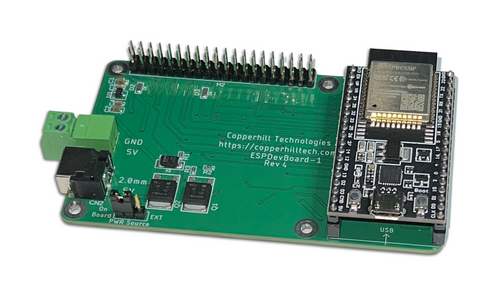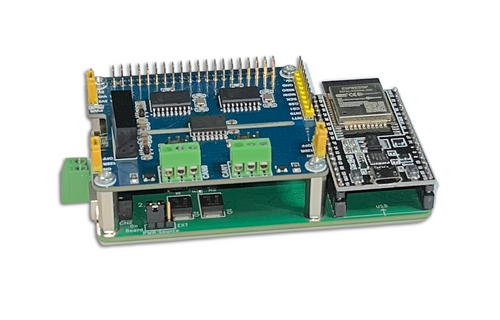Copperhill Technologies, a provider of embedded systems for CAN Bus development, introduces the espBerry, a new line of ESP32 development boards. The espBerry series includes the basic espBerry board, a dual CAN-Bus channel system, and an NMEA 2000 & NMEA 0183 development board. Further configurations are in the works. Still, the espBerry concept supports engineers with the implementation of additional HATs. Open-source code samples support all hardware configurations.
GREENFIELD, Mass. - Aug. 2, 2023 - PRLog -- The espBerry DevBoard combines the ESP32-DevKitC development board with any Raspberry Pi HAT by connecting to the onboard RPi-compatible 40-pin GPIO header.
The purpose of the espBerry should not be perceived as a Raspberry Pi alternative but as extending the ESP32's functionality by tapping into the vast offerings of RPi HATs in the market and taking advantage of the multiple and flexible hardware options.
The espBerry project continues to integrate an ever-increasing number of existing RPi HATs and provide the corresponding software libraries free of charge. Furthermore, multiple open-source code samples exploit the popular Arduino IDE's excellent programming capabilities.
The espBerry Base Board utilizes the ESP32-DevKitC development board, which provides wireless connectivity per WiFi, Bluetooth, or BLE (Bluetooth Low Energy). Furthermore, the development module connects to the Raspberry Pi GPIO header per SPI, UART, and didgital I/O. This configuration opens the door to many possible applications, including IoT.
The espBerry with Dual Isolated Channel CAN Bus expansion HAT, designed for the Raspberry Pi, supports the full CAN2.0 Standard, and it features multi-onboard protection circuits, high anti-interference capability, and reliable operation. As a result, it suits applications such as automotive devices or industrial automation.
The HAT is well documented, and multiple code samples use the C programming language under the Arduino IDE.
The espBerry with PICAN-M (M = Marine) utilizes a Raspberry Pi HAT with NMEA 0183 and NMEA 2000 connection. The NMEA 0183 (RS422) port is accessible via a 5-way screw terminal. The NMEA 2000 port is accessible via a Micro-C connector.
The board comes with a 3A SMPS (Switch Mode Power Supply), allowing to power the Raspberry Pi plus HAT from an onboard power source (12 VDC).
Contact
Wilfried Voss
***@copperhillmedia.com
Photos: (Click photo to enlarge)



Source: Copperhill Technologies Corp.
Read Full Story - espBerry - ESP32 Development Board with Raspberry GPIO Header | More news from this source
Press release distribution by PRLog
espBerry - ESP32 Development Board with Raspberry GPIO Header
August 02, 2023 at 16:32 PM EDT
